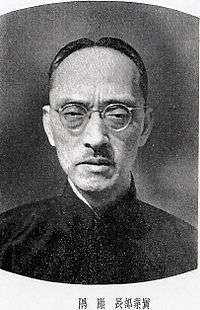Lian Yu
Lian Yu (Chinese: 廉隅; pinyin: Lián Yú; Wade–Giles: Lien Yü; born 1886[1]) was a diplomat, politician, judicial officer and lawyer in the Republic of China. He was an important politician during the Reformed Government of the Republic of China and Wang Jingwei regime (Republic of China-Nanjing). Another art-name was Liqing (励清).[2] He was born in Wuxi, Jiangsu.

Biography
Lian Yu went to Japan where he acquired Bachelor of Laws, Kyoto Imperial University. Later he returned to China, got a position in the Ministry for Foreign Affairs of the Beijing Government.[3] In January 1913 he was appointed Chief of the Zhejiang High Court, but he resigned in November.[4] The following March he was appointed Chief of the Zhili High Court which post he held until September 1920.[5] He was transferred to acting Chief of the Henan High court soon, but resigned next month.[6] Later he was an established lawyer in Tianjin.[3]
In April 1938 Lian Yu was appointed Vice-Minister for Foreign Affairs in the Reformed Government of the Republic of China, but resigned in June. Next February, the Minister for Foreign Affairs Chen Lu (陳籙) was assassinated by secret agents of the Nationalist Government, so Lian served 4 months as acting Minister for Foreign Affairs. In same August he was transferred to the position of acting Minister for Business (Xia Qifeng succeeded him as acting Minister for Foreign Affairs).[7]
In March 1940 the Reorganized National Government of China was established, Lian Yu was appointed a legislator (Member of the Legislative Yuan).[3] In the end of the same year he was appointed the first Ambassador to Manchukuo. In February 1943 he was recalled (Chen Jicheng 陳濟成 succeeded him in this position) and became Ambassador standing at the Ministry. In May 1945 he was appointed as the last Ambassador to Japan.[8]
After the Wang Jingwei regime collapsed, the whereabouts of Lian Yu remained unknown.
References
Citations
- Tokyo Asahi Shimbun, February 25, 1939, p.2.
- Liu Shoulin (etc.ed.), p.1424.
- Asahi Shimbun (Tokyo), January 20, 1941, p.1.
- Liu (etc.ed.), p.276.
- Liu (etc.ed.), pp.190-193.
- Liu (etc.ed.), p.233.
- Liu (etc.ed.), p.1026,1028.
- Guo Qingyou (main ed.), p.1919.
Sources
- Liu Shoulin (刘寿林), et al., eds. (1995). The chronological table of the Republic's Officer (民国职官年表). Zhonghua Book Company. ISBN 7-101-01320-1.CS1 maint: multiple names: authors list (link) CS1 maint: extra text: authors list (link)
- Guo Qingyou (郭卿友), main ed. (1990). List of Military and Political Officer on the Era of Republic of China (中華民国時期軍政職官誌). Gansu People's Press (Gansu Renmin Chubanshe; 甘粛人民出版社). ISBN 7-226-00582-4.CS1 maint: extra text: authors list (link)
| Political offices | ||
|---|---|---|
| Preceded by Chen Lu |
Minister of Foreign Affairs (Reformed Government of the Republic of China) April 1939 – August 1939 (acting) |
Succeeded by Xia Qifeng |
| Preceded by Wang Zihui |
Minister of Commerce (Reformed Government of the Republic of China) August 1939 – March 1940 |
Succeeded by office abolished |
| Preceded by Cai Pei |
Ambassador of the Wang Jingwei Government to the Empire of Japan May 1945 – August 1945 |
Succeeded by dissolution of the Wang Jingwei Government |